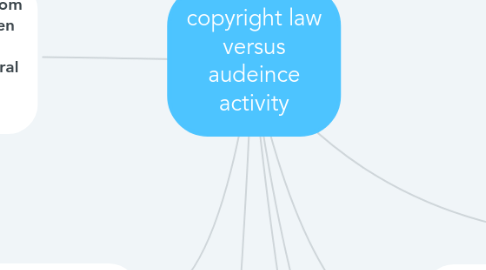copyright law versus audeince activity
von Alexa Socke

1. Denison, Rayna. “Anime fandom and the liminal spaces between fan creativity and piracy” International Journal of Cultural Studies 14.5 (2011): 449-466. yes
2. culturalists arguning in favour of audience activity and the importance of their contribution
2.1. Jenkins as the major culuturalist scholar with several publications: Jenkins, Henry. “When piracy becomes promotion: How unauthorized copying made Japanese animation profitable in the United States.” Reason 38 7 (2005): 78–79. yes Jenkins, Henry. Convergence culture: Where old and new media collide. New York, New York University Press. 2008. yes
2.2. Lévy, Pierre. The creative conversation of collective intelligence. In The Participatory Cultures Handbook. E.d. by Aaron Delwiche and Jennifer J. Henderson. New York and London, Routledge. 2013. (p. 99–108).
2.3. Russell, Adrienne, Mizuko Ito, Todd Richmond, and Mark Tuters. Ed. Kazys Varnelis. “Culture: Media convergence and networked participation.” Networked publics. Cambridge, MIT Press. 2008. (p.43–76).
3. anime fandom as an example of participations
3.1. Hernández, Álvaro D.H. “The Anime Industry, Networks of Participation, and Environments for the Management of Content in Japan.” MDPI Arts 7.42 (2018).
3.2. Denison, Rayna. “Anime fandom and the liminal spaces between fan creativity and piracy” International Journal of Cultural Studies 14.5 (2011): 449-466. yes
3.3. Lee, Hye-Kyung. “Between fan culture and copyright infringement: manga scanlation.” Media, Culture & Society 31.6 (2009): 1011-1022.
3.4. Napier, Susan. From Impressionism to Anime: Japan as Fantasy and Fan Cult in the Mind of the West. New York, Palgrave Macmillan. 2007
4. Fiske, John. The cultural economy of fandom. In: Lewis LA (ed.) The Adoring Audience: Fan Culture and Popular Media. London, Routledge. 1992. (p.30–49). yes
5. how does copyrights limit the public sphere and public domain?
5.1. Habermas, Jurgen. The structural transformation of the public sphere: An inquiry into a category of bourgeois society. Cambridge, MIT Press. 1991. yes
6. fan cultures
6.1. Fiske, John. The cultural economy of fandom. In: Lewis LA (ed.) The Adoring Audience: Fan Culture and Popular Media. London, Routledge. 1992. (p.30–49). yes
7. the power of media conglomerates to use fana ctivity as fan labour
7.1. Hardy, Jonathan. “Mapping commercial intertextuality: HBO’s True Blood.” Convergence: The International Journal of Research into New Media Technologies 17.1 (2011): 7-17. yes


